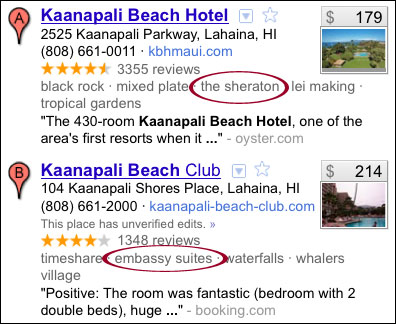Google Adds Business Characteristics To Maps Listings
Searchers looking for local businesses on Google Maps can now see brief, descriptive characteristics as part of the primary business listing. And they’ll be seeing the same things soon on Google.com, Places search and Google Maps for mobile, too. Google’s announcement explains that the terms come from “sources all across the web, such as reviews, […]

Google’s announcement explains that the terms come from “sources all across the web, such as reviews, web pages and other online references.” They seem to typically be a set of about five short keywords/phrases that describe the business and they can either be factual (“whole wheat pancakes”) or opinion-based (“best breakfast”), as shown below on a Denver restaurant’s listing.
There seems to be some value here when the descriptors introduce searchers to details they may not have found as quickly, like menu items or various types of customer sentiment.
But there’s also some risk involved. The terms are obviously chosen algorithmically, in much the same way that review clippings are chosen for display on Place Pages. And those, on rare occasions, can go horribly wrong.
These descriptive terms are usually only a couple words so the risk of something really bad showing up is minimized, but it seems safe to say that these hotels on Maui would prefer that the names of competitors not appear as part of their business listings.
The business owner has no say over what terms show up with his/her business listing. A Google spokesperson tells us that users/business owners can flag terms for removal on legal grounds by following the instructions in the Google Maps help center (presumably via the report a problem section). If that happens, “we’ll review those complaints and take appropriate action when necessary.”
Postscript: Chris Silver Smith shares several additional examples of negative terms appearing in business listings, including a doctor’s listing that includes the phrase “pretends to care” and a restaurant listing that says “terrible food.”
Contributing authors are invited to create content for Search Engine Land and are chosen for their expertise and contribution to the search community. Our contributors work under the oversight of the editorial staff and contributions are checked for quality and relevance to our readers. The opinions they express are their own.
Related stories
New on Search Engine Land

